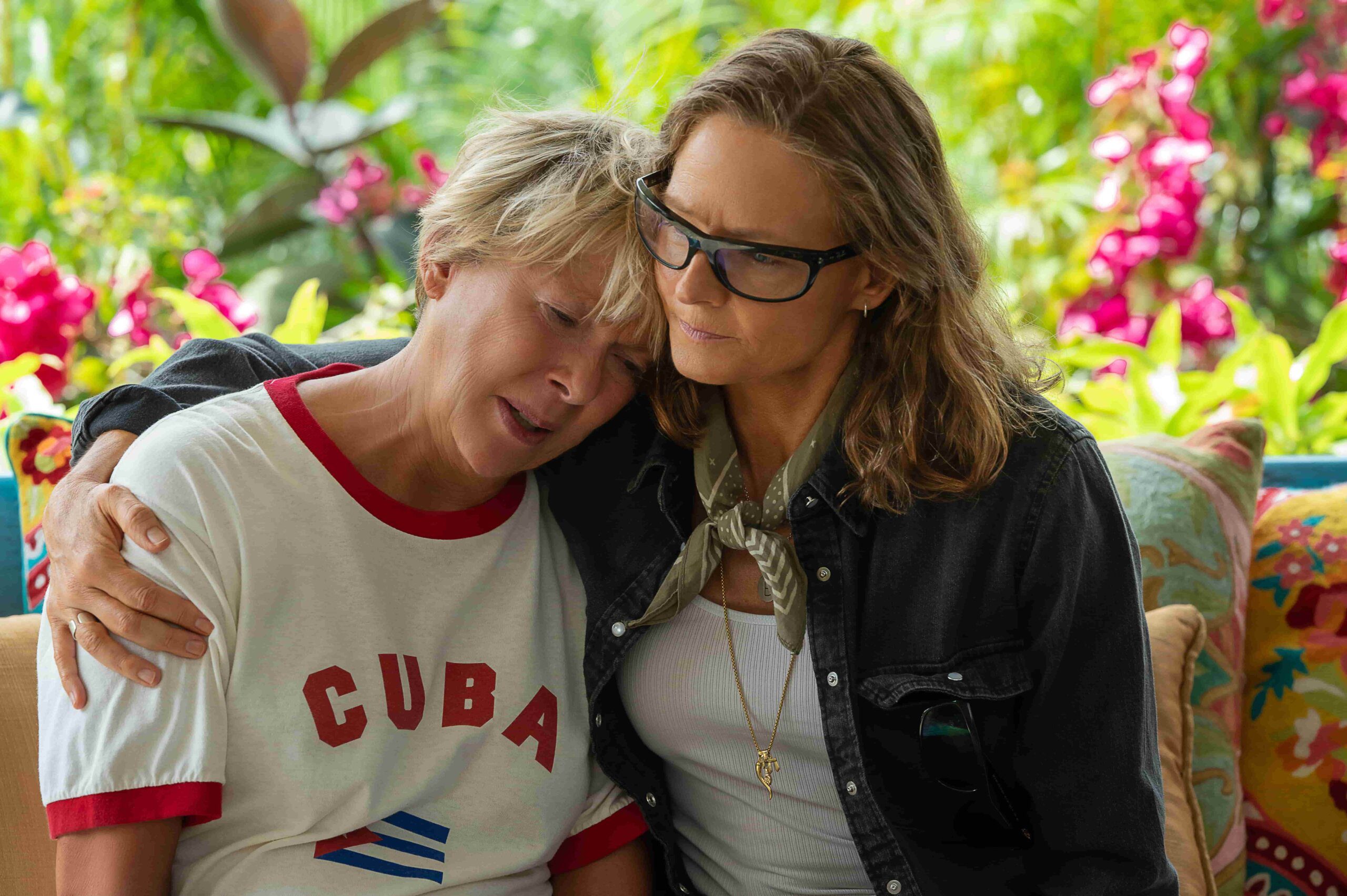Nyad, the new biopic about lesbian marathon swimmer Diana Nyad, now streaming on Netflix, is in many ways exactly the kind of queer representation that is sorely lacking onscreen. Nyad is considered to be the first person to swim unassisted from Cuba to Florida, a feat she accomplished in 2013 at 64 years old. Her story is framed as an inspirational one, and in many ways it is—just perhaps not in the way it intends to be.
Nyad is played by Annette Bening, with Jodie Foster co-starring as Nyad’s best friend and coach, Bonnie Stoll. The film is based on Nyad’s 2015 memoir, Find A Way: The Inspiring Story of One Woman’s Pursuit of a Lifelong Dream, which chronicles her quest to complete that swim. Seeing two elder lesbians on the big screen is refreshing. So many queer stories revolve around coming out or falling in first love (often as a young person), which is great, but limiting. Nyad seeks to tell a different kind of queer story—one of determination and accomplishment, of a life that doesn’t end after early adulthood and of queer platonic love, something that is so often missing from mainstream representations of our lives.
Nyad and Stoll were, in true lesbian fashion, once romantically involved. The film establishes that up top when Nyad tells someone that they “dated for, like, two minutes” and have since been friends for over 30 years. Foster has never looked more at ease onscreen, and seeing her play a lesbian for perhaps the first time in her career is almost a relief, if only for how naturally she inhabits the role. Nyad and Stoll’s relationship is a love story. The two are deeply committed to one another, though at times it’s unclear why Stoll sticks by Nyad. The film does not shy away from making her an incredibly hard character to root for, which isn’t necessarily a bad thing. Our male heroes don’t have the same burden of likability placed on them, so why should our inspirational women?
We don’t get much backstory on Nyad, aside from establishing that her father was intense, and told her that her destiny was to be a swimmer, and that she was a well-known marathon swimmer in her 20s. After a 30-year hiatus from the sport, she one day decides to get back into the pool, and it isn’t long before she has a singular focus—achieving the swim that has eluded her since she was pulled from the Straits of Florida after failing her first attempt to make the 112-mile swim in 1978, at the age of 28.
She ropes Stoll into the quest as her coach, and the two set off on a long course of training and establishing a team to help Nyad reach her goal. Nyad’s determination and belief in herself is at times admirable, but often seems delusional. The film does a good job of helping the audience understand just how far-fetched the idea of completing this swim is. She not only battles some of the most intense and unpredictable currents in the world, but some of the most dangerous sea creatures, as well. We watch over and over again as Nyad jumps back into the water, determined that she will make it, only to be pulled out of the water by her team, closer to death each time she tries. During one attempt, she is stung not once, but twice, by lethal box jellyfish and has to be resuscitated by her medical team on-board her boat. And still, she persists.
Persistence really is the message. In the years since she completed her swim, she has given TED Talks, written a book and become a motivational speaker, sharing the message of never giving up (though there is some controversy around whether or not she has exaggerated her achievements). Watching Nyad nearly die trying to achieve the seemingly impossible, I sometimes wondered if maybe she should have given up. Props to Bening for being willing to spend two hours onscreen looking like the immediate aftermath of a laser peel treatment and for communicating how self-possessed and, at times, selfish, one has to be to pursue this kind of goal (in case you were wondering, Nyad is a double Leo).
But there is no moral superiority in suffering. Sometimes the real victory is knowing when to say when, and to accept that there are things our bodies cannot do. Elite sporting culture is not a fan of this message, instead pushing a “win at all costs” mentality that ends up doing a lot of damage to a lot of people. Watching Nyad realize, at the end of the film, that her achievement was a team accomplishment, and not an individual victory, was nice. But the epiphany didn’t pack the emotional impact it should have after watching the way she treated the people around her for most of the film. But we learn at the end that Nyad and Stoll still talk every day. They are platonic life partners in every sense of the word and I love that kind of queer representation.
Nyad’s story is inspirational off-screen in ways that are just as important. She is continuing to prove that her perspective can evolve. When I saw that this film was being made, I was glad to know that the stories of lesbian athletes were being platformed. But I was concerned, too. Because two years ago, Nyad had written an op-ed for the Washington Post, opposing the inclusion of trans women in the women’s category of sporting events, namely swimming competitions.
At the time, she was also listed as a supporter on the website of the Women’s Sports Policy Working Group (WSPWG), an anti-trans lobbying and advocacy group composed mostly of former Olympians—many of them swimmers. At the time I pitched coverage of this film, Nyad was still listed as a supporter on the WSPWG website. I was surprised that Bening, who has notably and vocally expressed support of her own trans son, was playing someone who was on the record with anti-trans beliefs. I worried about what message Foster was sending to her LGBTQ2S+ community by starring in the film. And I was concerned about the kinds of queer stories that got told in the mainstream media, and whether they came at the expense of other, more marginalized, members of our community. When it was announced that a Martina Navratilova–Chris Evert biopic (a co-founder and supporter of the WSPWG, respectively) was also in the works, I wondered whether it was a coordinated PR push to garner goodwill for these athletes who were so publicly and doggedly working against members of their own community.
But earlier this month, Nyad was named one of Out magazine’s “Out 100” for 2023, and she expressed regret over having written that op-ed. “I have come to understand that the science is far more complex than I thought,” she told Out, “and there are clearly more educated experts than I who are creating policy to ensure that elite sports are both fair and inclusive of all women. I regret weighing in on that conversation and any harm I may have caused.”
Nyad has never shied away from speaking publicly about controversial topics. She came out as a lesbian in 1999, spoke out in 1989 about the sexual abuse she suffered at the hands of her swim coach and, now, has come out in support of trans inclusion in sports. In mid-September, she asked to be removed as a supporter from the WSPWG website, Nyad’s representative told Xtra.
“In recent times, the climate for the transgender community has turned dire and dangerous,” Nyad continued in the article. “I now see how all women are negatively affected by the ways transgender women are targeted by discrimination and abuse in sports and elsewhere.”
“I have come at this juncture to feel more comfortable promoting inclusion of transgender people at all levels of sports, as opposed to excluding them,” Nyad says in a statement to Xtra.
For her ability to evolve and admit where she may have been wrong, alone, Nyad is inspirational.
Nyad is in theatres and streaming on Netflix now.


 Why you can trust Xtra
Why you can trust Xtra


